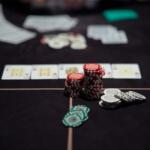The Path to Poker Mastery: Strategies for Success
Poker is not just a game of chance; it’s a complex blend of skill, strategy, and psychology. While luck plays a role, consistent success in poker comes from a deep understanding of the game and a commitment to improving one’s skills. In this article, we’ll explore essential strategies that can help both beginners and seasoned players enhance their game.
- Understanding the Role of Skill and Luck: Poker is a skill-based game, but luck is a factor.
- Study and Practice: The more you study poker strategies, the better your results.
- Handling Variance: Accept that losing streaks are part of the game.
- Managing Tilt: Learn to control emotions to avoid poor decisions.
- Long-Term Commitment: Success requires dedication and patience.
The Balance of Skill and Luck
While poker is often perceived as a game of luck, the reality is that skill plays a significant role in determining long-term success. Even the most proficient players encounter losing streaks; however, they consistently manage to turn a profit over time. This can be attributed to their mastery of poker strategies and their ability to adapt to various game situations.
Successful players invest countless hours at the tables and dedicate time to studying the game. They analyze their play, review hand histories, and learn from their mistakes. This commitment to improvement is what separates the winners from the rest.
Study: The Foundation of Winning Strategies
To become a winning player, it’s crucial to familiarize yourself with poker fundamentals. This includes understanding starting hands, position, pot odds, and the various betting strategies. Charts that outline which hands to play before the flop can be invaluable tools for both novice and experienced players.
Using these charts while playing can help reinforce your knowledge until you can recall this information from memory. The more you understand the math behind the game, the better equipped you’ll be to make informed decisions at the table.
Practical Experience
However, studying alone isn’t sufficient. Practical experience is essential to apply what you’ve learned. Playing regularly allows you to test your knowledge in real situations and adjust your strategies based on the outcomes. The combination of theoretical knowledge and practical experience is key to becoming a successful poker player.
Accepting Variance: The Nature of the Game
Variance is an inherent part of poker. It refers to the difference between expected outcomes and actual results. For instance, in Texas Hold’em, pocket aces (AA) are statistically favored against lower pocket pairs, but they don’t guarantee a win every time. This uncertainty can lead to frustrating losses, even when you play optimally.
Recognizing that variance is unavoidable helps players maintain perspective during challenging times. It’s essential to understand that losing a few hands doesn’t indicate poor play; it’s simply part of the game’s natural ebb and flow.
Managing Tilt: Emotional Control
Tilt is a term that refers to the emotional frustration that can arise from unfavorable outcomes. Even the most seasoned professionals can fall victim to tilt, especially after a series of bad beats. Managing this emotional response is crucial for long-term success.
When you experience tilt, you may make impulsive decisions or stray from your optimal strategy. It’s vital to recognize what triggers your tilt—whether it’s a reckless opponent, a streak of bad luck, or even external factors like stress from daily life. Developing strategies to cope with tilt can help you maintain focus and make sound decisions at the table.
Strategies for Managing Tilt
- Take Breaks: If you feel frustration building, stepping away from the table can help you regain composure.
- Practice Mindfulness: Techniques such as deep breathing or meditation can help you manage your emotions.
- Reflect on Your Play: Analyze your decisions after a session to learn from mistakes without letting emotions cloud your judgment.
Long-Term Commitment: The Road to Mastery
Becoming a successful poker player requires a long-term commitment to improvement. The journey is not easy, and results may not come immediately. However, the effort you invest in studying and playing will directly correlate with your success.
Many players enter the game with the hope of winning big, but it’s essential to keep realistic expectations. Focus on gradual improvement and understanding the game’s intricacies. As you develop your skills, you’ll find that your results will begin to reflect your hard work.
Reader Q&A
1. How can I improve my poker skills quickly?
The best way to improve quickly is to study poker strategy while also playing regularly. Utilize charts for starting hands and analyze your gameplay to identify areas for improvement.
2. What should I do after a bad beat?
After experiencing a bad beat, take a moment to breathe and regain your composure. Consider stepping away from the table briefly to clear your mind before continuing to play.
3. Is it normal to go on tilt?
Yes, going on tilt is a common experience for many players. The key is to recognize when it’s happening and implement strategies to manage your emotions effectively.
In conclusion, mastering poker is a journey that combines skill, knowledge, and emotional control. By understanding the balance of luck and skill, studying diligently, accepting variance, and managing tilt, you can significantly improve your chances of success at the poker table.











